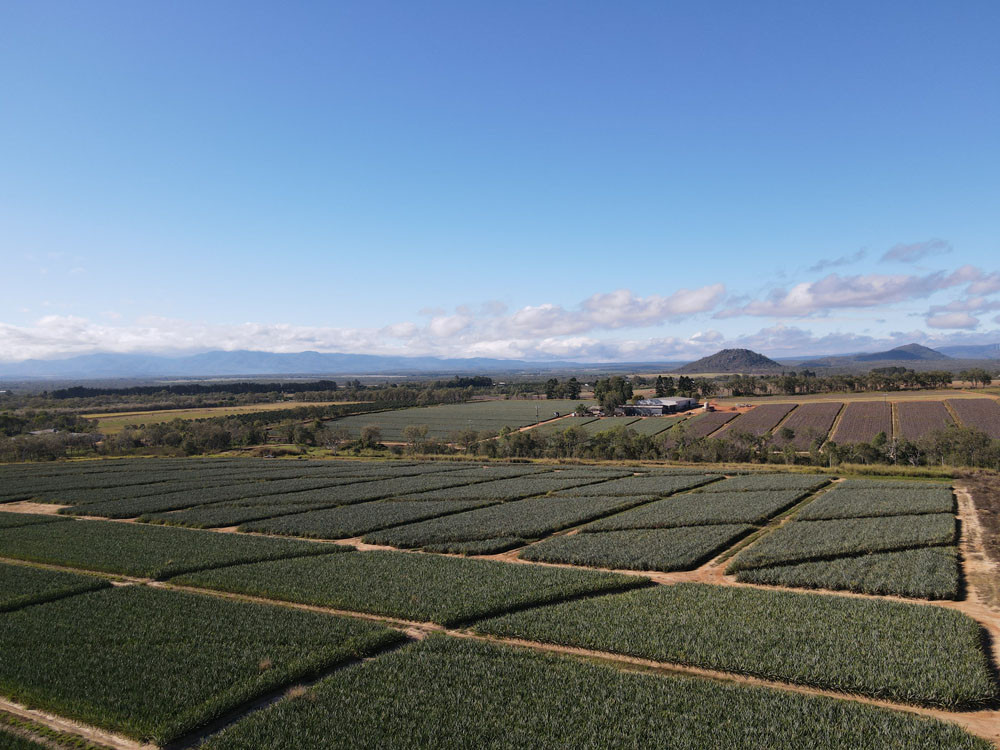On The Land
20 October, 2023
Piñata pineapples “back in business”
Pineapples from Australia’s leading producer Piñata Farms are once again in full supply following a one-in-a-100-year natural flowering which led to a nationwide shortage of pineapples during the past eight months.

Their Mareeba operation has begun its annual harvest about a fortnight early due to a warm winter in Far North Queensland, ending the longest shortage of fruit in the farming business’s history.
Commercial pineapple production was pioneered by Piñata Farms at Mareeba in Far North Queensland to supplement production from the south-east Queensland area and to ensure a 12-month supply.
Piñata Farms is now Australia’s largest pineapple producer and the only one to supply fresh pineapples year round.

They are available in every state of Australia at leading supermarkets and independent outlets.
They are always sold without their tops.
Founded by pineapple farmer Geoff Scurr at Wamuran, Piñata Farms is now operated by Geoff's sons, Gavin and Stephen Scurr.
It is a proud Queensland farming business with origins dating back to the 1960s in the state's south-east.
Tropicals general manager Stephen Scurr said floods in Queensland in early 2022 brought on the natural-flowering event across the state’s major growing regions from Yeppoon south, in late 2022.
“The natural flowering caused fruit grown at Wamuran, which is our traditional and key growing region on the Sunshine Coast, to ripen prematurely, resulting in small pineapples in small volumes,” Mr Scurr said.
"As it was outside Mareeba's harvest period, we had to wait it out.
“Small fruit is usually unmarketable or sold for juicing.
“However, as demand outstripped supply, supermarkets accepted small fruit and we managed to maintain an in-store presence.
“If the supermarkets had not taken small fruit, we would have had nothing available during this time.
“As we usually supply 52 weeks of the year, it was an odd position to be in.
“On the flipside, grower returns were better than we expected during the shortage and more aligned to the cost of production.
“We’re expecting to see some price flattening as the season progresses and supply picks up.”
He said the Mareeba operation which was unaffected by conditions felt in the south-east in 2022, would harvest more than 40 hectares of pineapples five to six days a week until early 2024.
“This includes five per cent more than usual planted in 2021, coincidentally before the natural-flowering event,” Mr Scurr said.
“We did this to compensate for Wamuran being unable to plant a full crop in late 2021 because it was too wet.”
From planting to harvesting a pineapple generally takes two years.
Piñata pineapples have a sweet and succulent golden flesh with low acidity and a mild, pleasant aroma.
Depending on the time of year, the shell colour may vary from green to yellow or orange, however they are always sweet inside.
The pineapples are hand-picked and taste-tested in the field at the peak of ripeness.
They do not continue ripening after picking.
Pineapples ripen from the bottom up with the natural sugars or sweetness progressively rising to the top as the fruit matures.
Pineapples convert starches in the plant's base into sugars.
A consistent shell colour indicates consistent sweetness throughout the fruit.
Ripe pineapples smell fresh and fragrant at the stem end.
A crew of 17 seasonal workers from Vanuatu which are all Piñata Farms returnees, had been recruited under the Pacific Assisted Labour Scheme for the season.
“Pineapples are certainly back in business,” Mr Scurr said.
“From late October onwards, consumers can expect an abundant supply of premium fruit from the north with optimal size, quality and flavour.
“Spring fruit usually has a blush of yellow on the base and light, yellow flesh.
“The skin might be slightly greener when we get closer to summer but the flesh will always be golden.
“We know consumers have missed pineapples of the size and taste they’ve come to expect and will be excited to see a plentiful supply offering lots of choice.
“At Mareeba, we’ve already had carloads of farmgate customers.”
Fruit picked and packed at Mareeba is transported by road or rail to Wamuran for distribution to leading supermarkets around Australia.
Mr Scurr said Piñata’s Wamuran farm which was still producing a trickle of small pineapples, would soon wind down for the year to focus on planting.
He said the Sunshine Coast harvest would resume again early next year.


